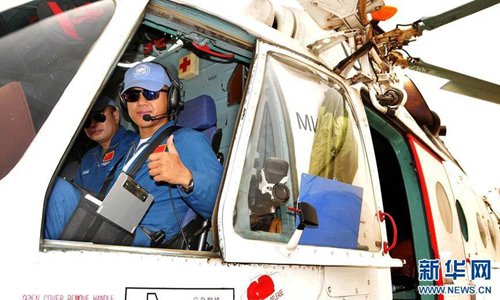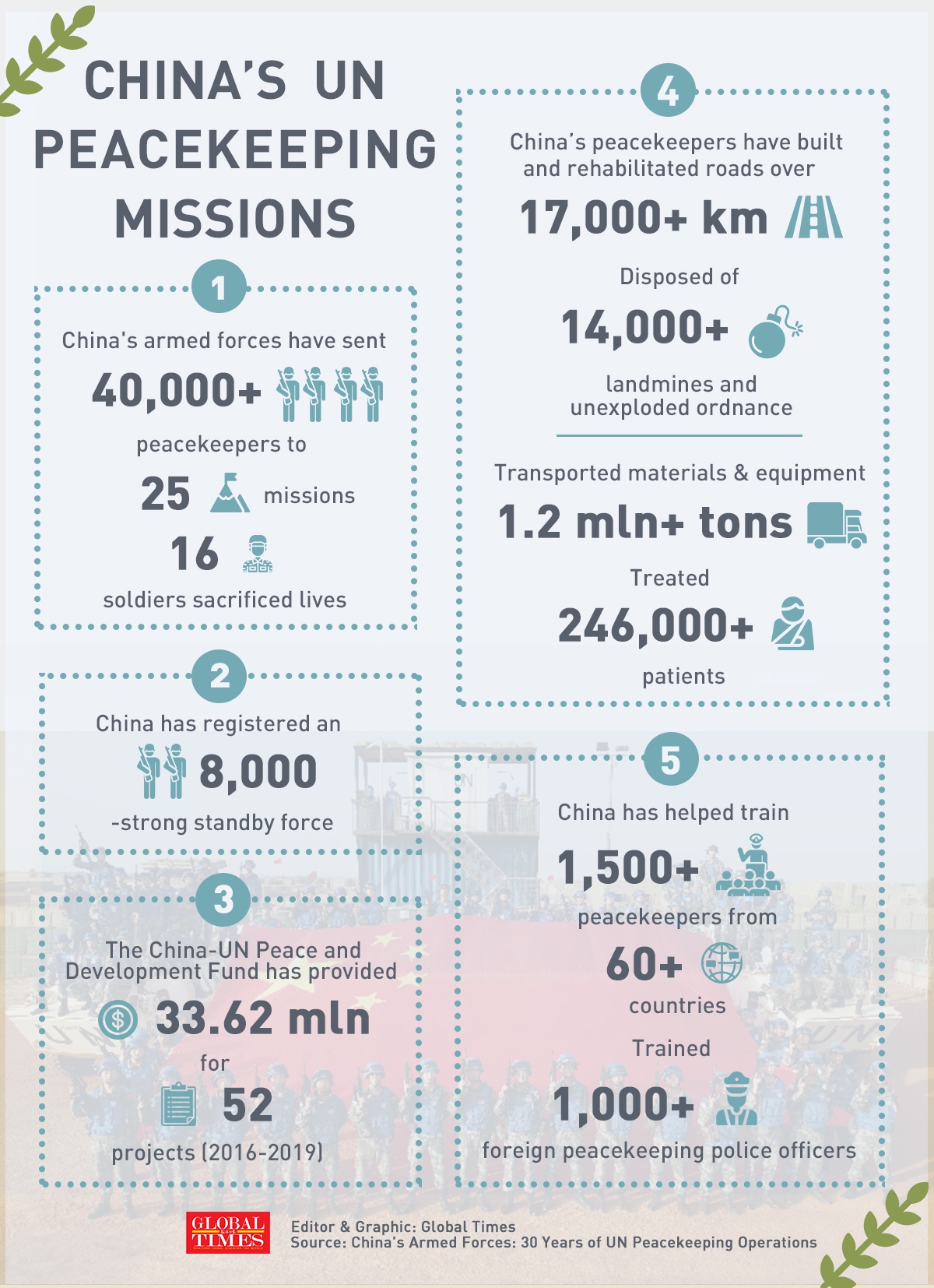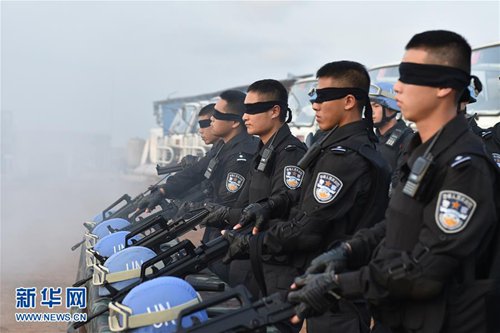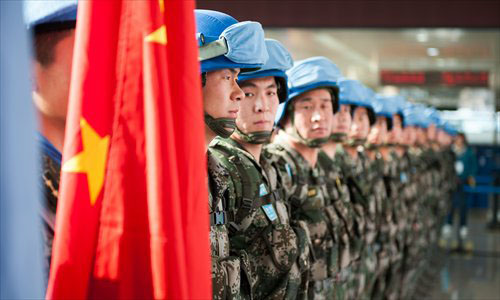30 years on, China has become an important part of UN peacekeeping missions

The first UN peacekeeping helicopter unit from China made its first flight at Sudan's Khartoum International Airport on August 1, 2017. (Photo/Xinhua)
This year marks the 30th anniversary of China's armed forces participating in UN peacekeeping missions. Over the past three decades, China's peacekeeping capacity has been greatly improved in all aspects. On Thursday, a Global Times reporter visited a training base of the department of peace missions under the Ministry of National Security in Beijing, where officers and soldiers who once participated in peacekeeping missions shared their personal stories.

China’s UN peacekeeping missions Infographic: GT
Cradle of peacekeeping soldiers
Inside a courtyard that occupies an area of more than 5,000 square meters, the ground is covered with small stones and observation posts deployed at the four corners of the courtyard. The situation outside is clear at a glance when stepping on the observation posts. This is a simulated peacekeeping unit camp in accordance with the requirements of the United Nations, which can accommodate 60 people.
In the courtyard, there are 54 sets of container rooms, including dormitories, restaurants, underground bunkers, shooting bunkers and other facilities. The camp serves as a model and reference for the construction of overseas peacekeeping camps. On the right side of the gate sits a row of container rooms serving as war and duty rooms.
The walls of these rooms are covered with different kinds of English documents, a map of the mission area and telephone numbers of relevant agencies. A variety of radio systems are placed on the table to keep in touch with team members on field patrol, understand their position and status so as to give appropriate instructions.
Outside the camp, there is also a comprehensive peacekeeping training ground covering an area of more than 30,000 square meters, including a simulated peacekeeping campaigning site, simulated UN military observer posts, simulated blocks and a simulated minefield.
A staff member working there introduced that the environment simulates the actual mission area environment to the maximum extent, so that trainees can experience the actual working and living conditions in the mission area before deployment, and can carry out field exercises and strict assessment under realistic conditions.
The Chinese military has so far participated in 25 joint maintenance operations and sent more than 40,000 officers and soldiers on peacekeeping missions. The key members of these peacekeeping personnel were trained at this base before performing their respective duties. Therefore, the training base is regarded as the “cradle” for China’s peacekeeping personnel.

Swat team members of the Chinese UN peacekeeping force stationed in Liberia undergo training on Nov. 19. The soldiers were tested on several skills, including disassembling guns while blindfolded and riot prevention capabilities. (Li Jinliang/Xinhua)
Three stages of China’s peacekeeping development
China's military participation in UN peacekeeping operations began in April 1990, when they sent five military observers to the UN Truce Supervision Organization (UNTSO) for the first time.
Cai Hui, an associate professor of the Department of International Relations at the National University of Defense Technology and senior instructor at the department of peace missions under the Ministry of National Security, told the Global Times on Thursday that China's peacekeeping operations can be divided into three phases.
“In the first exploratory phase, the UN had little demand for peacekeeping operations, and the number of Chinese personnel sent abroad was correspondingly small. During the second phase of gradually expanding participation, China sent more troops of different types and sizes to more mission areas. The number of Chinese peacekeepers such as engineers, medical personnel and transport personnel also increased during this period. The mission areas then included the Democratic Republic of Congo (DRC), Liberia and Sudan. The landmark event in the third phase was China's first deployment of its security forces overseas. In 2013, the Chinese military sent a 170-member security detachment to the United Nations Multidimensional Integrated Stabilization Mission in Mali (MINUSMA), followed by a peacekeeping infantry battalion and a helicopter unit,” Cai said.
Cai noted that with the increasing diversification of peacekeeping missions, more demands have been placed on peacekeepers, and the ability of Chinese peacekeepers to carry out their missions is constantly improving. In addition, the Chinese military is equipped with equipment that can fully meet the needs of UN peacekeeping operations.
“The ability and quality of China's peacekeeping forces are obvious to all. So far, China's peacekeeping forces have maintained a record of zero violations of discipline and zero repatriation, which is unique among all UN peacekeeping forces. It is also a good tradition that China's peacekeeping forces have followed consistently,” he said.
However, with the deepening of China's participation in peacekeeping operations, some Western countries have accused China of taking the opportunity of participating in peacekeeping operations to expand its military strength and seek economic interests in local countries. Cai said that this accusation is not consistent with the facts but it exposes that some Western countries have a narrow mindset and understanding of China's participation in UN peacekeeping operations.
“First, the UN peacekeeping operations are not just about military operations. It is a biased statement that China's military forces want to enhance their capability to carry out military tasks by participating in UN peacekeeping operations. Peacekeeping now includes not only the traditional tasks of isolating conflicts and monitoring cease-fires, but also assisting humanitarian relief agencies in carrying out humanitarian assistance tasks and training host governments, military and police to improve legal construction as well as local people's livelihoods,” Cai said.
“Meanwhile, due to the high degree of external risk in many mission areas, which includes facing dangerous circumstances such as terrorist attacks and armed conflicts, Chinese peacekeeping forces can carry out missions in an environment close to the battlefield. From this perspective, the military’s anti-pressure capability has been improved,” he added.
When China sent its first contingent of security guards overseas, some people noticed that it was different from the contingents that the country used to send. Later China sent infantry battalions and helicopter units. These new changes raised questions about whether China's peacekeeping operations had changed. Cai said such suggestions are pure misunderstandings.
He said that within the UN framework, there is no distinction between combat troops and non-combat troops. The infantry brigade and security guards we sent belong to the security forces category, and the helicopter unit is transport helicopters performing logistics tasks. The security forces are mainly used to protect the safety of civilians.
“In addition, in terms of the proportion of security forces to support units, China has more support units. Compared with other major troop-contributing countries, the number of China's security forces is very small. Some countries participate in the peacekeeping operations with mainly infantry battalions, and their troop size can reach 6,000-7,000 people or more,” he said.

Chinese peacekeepers line up during a departure ceremony before flying to South Sudan for a UN peacekeeping mission at Ji'nan Yaoqiang International Airport in Ji'nan, capital of East China's Shandong Province, on April 7, 2015. Photo: IC
High-level officers
With the increased participation in UN peacekeeping operations, Chinese peacekeepers have also been awarded important positions. There was one major general serving as deputy commander of the Special Commissioner and two senior colonels serving as theater commanders.
He Xing is an associate professor at the National University of Defense Technology and senior instructor at the department of peace missions. He served as the commander of the southern theater command of the United Nations Mission in South Sudan (UNMISS) from December 2017 to December 2018, at which time he was in charge of theater operations.
He told the Global Times on Thursday that the UN has adopted a “competition system” for the post of commander in a war zone, in which seven or eight countries nominate their nominees for the post. After several rounds of selection by the UN, the individual with the highest score wins. The job requires knowledge of military, intelligence, operations and logistics, and their responsibility is to manage the 4,000-strong peacekeeping force and make arrangements for its operations.
He has a rich resume. He has participated three times in peacekeeping operations in the DRC, Darfur and South Sudan, and held relatively high positions, which is one of the key factors that made him stand out.
But He believes his rise to the job is a reflection of China's growing influence and the UN’s recognition of China's peacekeeping operations. "Over the past 30 years, peacekeepers have become better adapted to the UN’s command system, become more familiar with the UN Standard Operating Procedures, and have a better understanding of various provisions. Their communication capabilities have been gradually improved, and the overall quality and professionalism of the Chinese peacekeepers are commendable.”
Cai said soldiers of all countries have one thing in common: they respect the strong. The development of China is seen in the eyes of foreign countries’ soldiers, and their reverence for Chinese soldiers arises accordingly. “In peacekeeping operations, China has made great contributions and sent more and more personnel and different types of peacekeepers, making peacekeeping missions more and more inseparable from China’s peacekeeping forces,” Cai said.

Swat team members of the Chinese UN peacekeeping force stationed in Liberia undergo training on Nov. 19. The soldiers were tested on several skills, including disassembling guns while blindfolded and riot prevention capabilities. (Li Jinliang/Xinhua)
China speed
Zhao Jiawen, born in 1994, is a pilot of the second Chinese peacekeeping helicopter detachment to Darfur, Sudan. Zhao had excellent academic performance results and strong operational abilities at school.
Since 2017, the Chinese military has sent a 140-person helicopter squad to the United Nations–African Union Mission in Darfur every year, which is the only military helicopter squad in the mission area.
According to Zhao, the helicopter unit directly connects with the aviation department of the United Nations Command, so the language level requirements are very high. The task responsibilities of the unit include air patrol, battlefield detection, daily supply of passenger goods, medical escort and transport of dangerous goods.
Zhao said Chinese peacekeepers take their good traditions overseas. For example, when the first helicopter units arrived at the mission area, they were faced with an empty field that needed to be built by themselves. Three months later, the camp was completed, and the relevant UN departments did not find anything that did not conform to the rules and regulations when they checked the camp. They praised this as reflecting on China's speed and high standards
When the Chinese engineer detachment carried out mine sweeping missions in Lebanon, different countries have different mine sweeping methods, but practice has proved that China's standard operating procedure for mine clearance is the most economical and effective, leading to it actually being determined as the standard operating procedure in the mission area, a Global Times reporter learned.
COVID-19 prevention efforts
This year, the COVID-19 epidemic quickly broke out in the mission area of the UN Peacekeeping Force in Mali, with a camp nearby the Chinese peacekeeping force guard unit recorded a death case.
Liu Yong, commander of the seventh batch of the Chinese peacekeeping force in Mali, told the Global Times on Thursday that although everyone had to wash their hands during the epidemic, the water consumption in Africa is limited, with each person only able to use 40 liters of water per day. Liu said it was proposed that water consumption should be increased in war zones and food supplies and oil should be taken at different times to avoid large gatherings.
“We have made six recommendations and all of them have been adopted. There is no way we can change the course of the epidemic, but we can improve preparedness by being proactive,” he said.
During the epidemic, the Chinese peacekeeping troops adopted closed management and other defensive measures, making them the only detachment in the theater whose mission was not interrupted due to the epidemic. The achievements of the Chinese peacekeeping troops in the epidemic prevention won them widespread recognition.
Liu, who has carried out three peacekeeping missions from January 2009 to August 2020, said the most common evaluation made by foreign peacekeeping teams on China's peacekeeping missions is that they are becoming “more and more professional.”
During the mission, the helicopter unit flew thousands of hours, four to five days a week, and performed many dangerous missions. Zhao spoke with pride of being a Chinese soldier. “Having performed many difficult and dangerous tasks in the mission area, I am now more confident, and my technical abilities have been improved. We have proven with our skills and our personal experience that we are builders and participants in peacekeeping operations,” he said.
Meanwhile, peacekeeping operations opened a window for Chinese military to communicate with the outside world and enhance the understanding between different peoples.
“Before they met us, some read preconceived reports, hyping up the ‘China threat’ theory. But after they met us, they found out that Chinese soldiers are not like what was portrayed [in the media]. The Chinese soldiers are like ‘old cattle’ who work diligently but not talk much. After a period of contact, they found the Chinese soldiers are not only disciplined but also outstanding in every way,” Cai said.